Dedicated freight is a trucking solution in which a carrier allocates a fixed fleet of trucks and drivers exclusively to a single shipper under a long-term agreement. In this model the carrier “dedicates” equipment and personnel to the customer’s lanes or regions on a multi-year contract.
Dedicated trucking provides reliable capacity that is contracted, and consistent, yet flexible to scale with business needs. Unlike common carriers or brokers that haul loads on a spot-by-shipper basis, a dedicated provider guarantees committed trucks to one customer. And unlike a private fleet (where the shipper owns the trucks and hires the drivers), dedicated carriers own the tractors and trailers themselves and assume the risks of maintenance, insurance, and driver management. In effect, a dedicated freight solution gives shippers the benefits of a private fleet without the capital investment and liability of owning the assets.
HOW DEDICATED FREIGHT WORKS
In a dedicated freight arrangement, the shipper and carrier negotiate a contract (typically 2–5 years) defining the service requirements, routes, equipment needs, and pricing. The contract specifies an agreed number of trucks and trailers and often a minimum volume or mileage commitment for the term. Carriers will then allocate a portion of their fleet exclusively to that shipper. These dedicated trucks run on predefined routes or lanes with scheduled pick-ups and deliveries, effectively becoming an “extension” of the shipper’s operations. For example, the shipper might have a dedicated fleet of 10 dry vans or refrigerated trailers running daily routes between a factory and multiple retail distribution centers. The fleet’s routing is planned in advance to match the shipper’s regular shipping needs.
Our Streamlined Process
Single point of contact
Shipment-to-vehicle matching system
Vetted & exclusive carriers
Real-time monitoring & alerts
Types of Vehicles
SPRINTER VAN
ExpeditedFreight.com's expedited Sprinter vans have the capacity to meet your local, regional, or long-distance ground shipping needs. Measuring 8-12’ x 52” x 70", our carefully-selected vans have the capacity to carry loads up to 3,000 lbs.
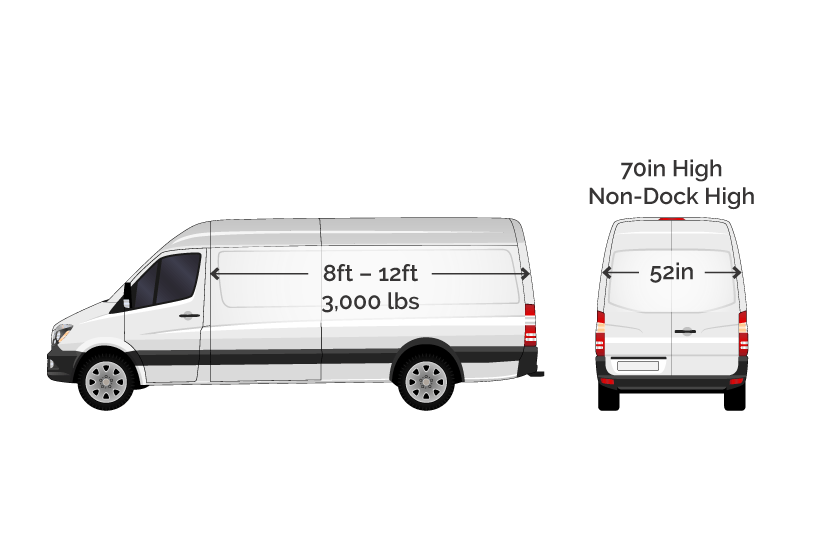
BOX TRUCK
We pride ourselves in working with trusted partners that offer carefully-vetted box trucks, from temperature-controlled vehicles to varying sizes that accommodate smaller loads. Our box trucks, or small straight trucks, measure 12-16’ x 94” x 70” and have the capacity to carry up to 5,000 pounds.
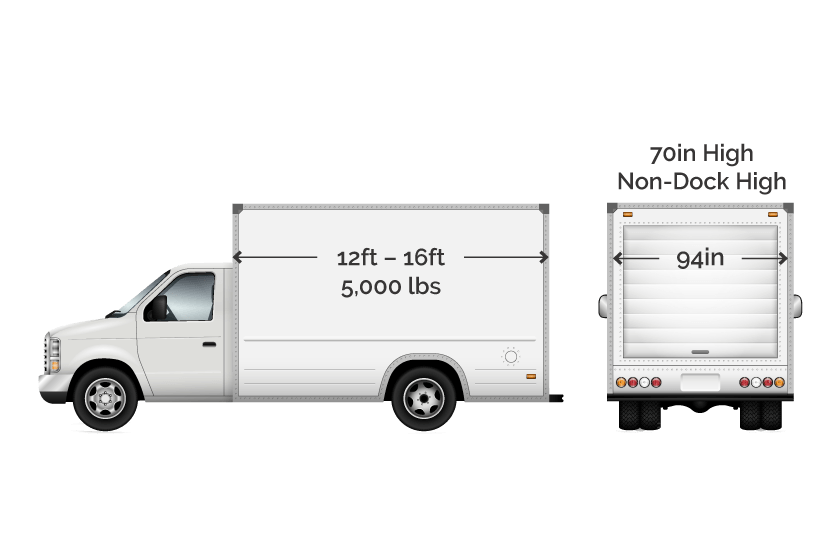
STRAIGHT TRUCK
Measuring 22-26’ x 96” x 96”, our straight trucks can carry loads up to 9,000 pounds. Our large straight truck services offer focused logistics, professional drivers, and deeply-experienced expeditors to get your delivery where it needs to go.
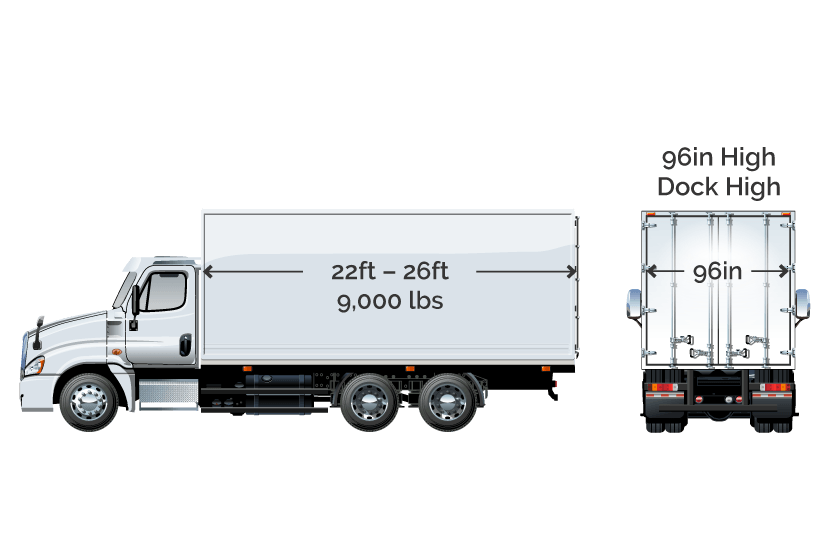
HOT SHOT TRUCK
We'll happily arrange for your freight to be transported via hot shot trucking services. We've proudly partnered with hot shot trucking providers across North America to give you access to carefully-vetted ground delivery vehicles for your time-critical freight.
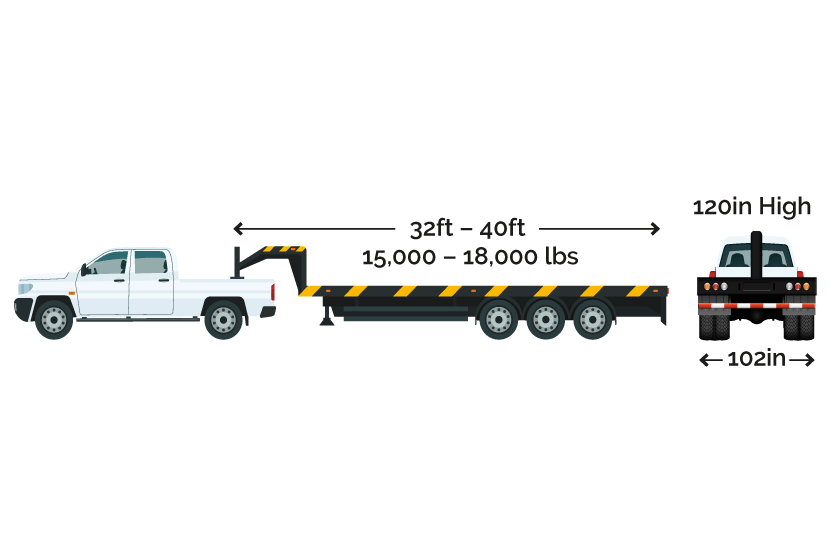
53' DRY VAN
Our fleet of 53-Ft dry vans can carry loads up to 42,000 pounds. Measuring 53’ x 99” x 102”, these carefully-vetted vehicles will ensure your time-sensitive freight arrives at its destination safely.
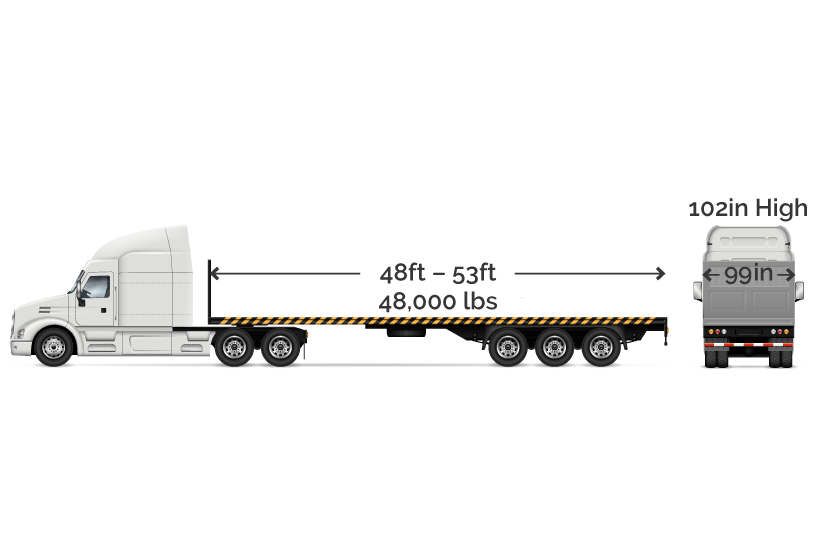
FULL FLATBED
ExpeditedFreight.com's full flat bed vehicles can accommodate wide or mega-size loads, such as specialized equipment machinery of all weights and sizes. Measuring 48-53’ x 102” x 102”, our fleet of full flat bed vehicles can carry freight of up to 48,000 pounds.

TALK TO AN EXPEDITOR NOW
Get a Free Freight Quote Now

Pricing Structures and Cost Factors
Typical dedicated freight pricing blends fixed and variable components. Carriers often quote a base fee (reflecting driver labor, equipment depreciation, and guaranteed capacity) plus a mileage rate (covering fuel, additional mileage, etc.). In practice, factors influencing the cost include:
- Equipment type and customization. Different trailer types (dry van, refrigerated, flatbed, tanker, etc.) carry different costs. Custom or specialty equipment (like lift-gates, drop decks, or automated unloading gear) adds expense.
- Driver labor and benefits. Dedicated drivers usually receive better schedules (home each night) which can command higher pay. Turnover and training costs for specialized freight (hazmat, refrigerated loads) can also raise rates.
- Fuel and maintenance. Dedicated fleets often pass through fuel surcharges tied to standard indices. Longer routes or idling (detention time at docks) increase fuel burn. Carriers factor average maintenance and tire costs per mile into the rate.
- Route and distance. Long-haul or cross-country dedicated lanes may cost less per mile (due to efficiency) but require higher base hours. Dense urban routes can be more expensive on a per-mile basis. Toll roads, bridge fees, and regional taxes (e.g. highway user fees) also affect pricing.
- Volume commitment and run time. How many trucks/days you commit influences price. Full-year guarantees of a large fleet will earn steeper volume discounts. Seasonal or part-year contracts will be priced higher to account for downtime.
- Additional services (accessorials). Things like layover pay, detention (waiting) fees, lumper fees (dock labor), and insurance fees can be included or billed separately. Expedited or white-glove services (special handling, customer delivery interactions) will add premium charges.
In general, dedicated rates tend to be higher per-mile than long-term private fleet costs (since the provider needs margin) but lower and more stable than open-market spot prices. Shippers typically pay a blended or indexed rate, with clear formulas for extras (fuel surcharges, detention). According to ATS, carriers consider “equipment, driver wages, fuel, maintenance, route distance, specific service requirements, and market conditions” when setting a dedicated rate. The result is a customized, predictable contract rate for the term. Having stable volumes and a longer contract length usually lets the shipper negotiate better per-mile pricing than on short-term bids
Key Benefits of Dedicated Freight
Dedicated freight offers several advantages over other shipping models, particularly for high-volume or time-sensitive operations.
Dedicated freight is often at the forefront of logistics tech adoption. Dedicated carriers frequently possess robust IT systems and expertise. They are “experts at buying and maintaining cutting-edge transportation solutions.

Cost Stability and Predictability
With a dedicated contract, shippers lock in long-term rates and are insulated from spot-market spikes. As ATS points out, dedicated service provides a “predictable, stable pricing/cost model”. Because the carrier has guaranteed loads, it can offer more consistent rates than common carrier contracts. Shippers can therefore forecast transportation costs far in advance. Schneider likewise notes that longer contracts and consistent volume lead to “consistent pricing,” letting you manage shipping rates and budget with confidence. In other words, dedicated freight smooths out the year-to-year volatility that many shippers face with spot bookings.
Guaranteed Capacity
Dedicated arrangements secure the equipment and drivers you need when you need them. Schneider highlights that with dedicated transportation, “freight capacity is guaranteed for your routine shipping needs”. In the dedicated contract, you and the carrier agree on a predefined number of tractors and trailers and the geography of service. The carrier is then obligated to keep that fleet ready and loaded for your freight. This eliminates the uncertainty of finding trucks in a tight market. Carriers often even build backup plans (using their brokerage network or subcarriers) to ensure service continuity during volume surges or driver shortages.
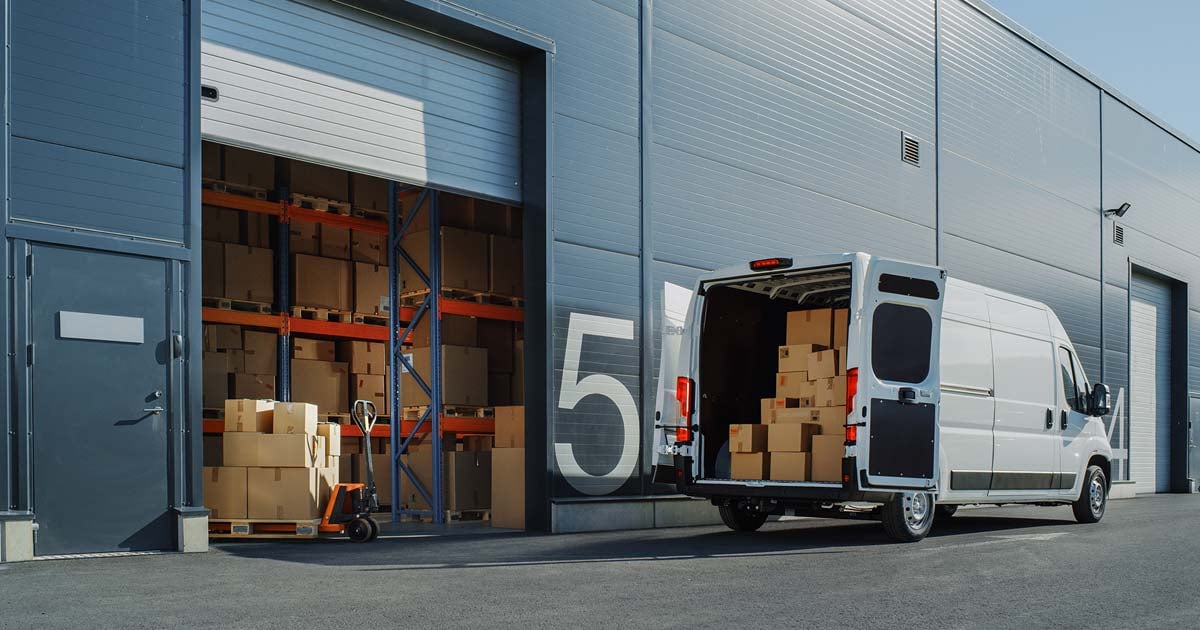
Service Consistency and Customization
Because the driver and equipment are dedicated to one shipper, service tends to be more consistent. The same drivers handle the same routes, learning the shipper’s processes, loading docks, and any special requirements. This leads to fewer missed pickups or delays. Specialized equipment and handling can also be part of the service. For instance, a dedicated provider can outfit trucks with liftgates, refrigerated trailers, flatbeds, or even drop-ship racks as required by the shipper’s product. Schneider notes that dedicated carriers recruit qualified drivers and train them for the customer’s specific needs, whether temperature control, freight handling, or delivery techniques. The result is greater product integrity and reliability: the carriers often measure and optimize performance (on-time delivery, damage rates, etc.) as part of the contract.

Improved Planning and Visibility
Having a dedicated fleet streamlines planning. Shippers can align production and inventory with a known transportation schedule, improving supply chain integration. Carriers typically provide transparency through a TMS or customer portal, giving real-time visibility into location, delivery times, and proofs of delivery. Many dedicated carriers also offer analytics reports on cost per mile, utilization, and other metrics. This tight integration of transportation data enables continuous improvement and collaboration between shipper and carrier.
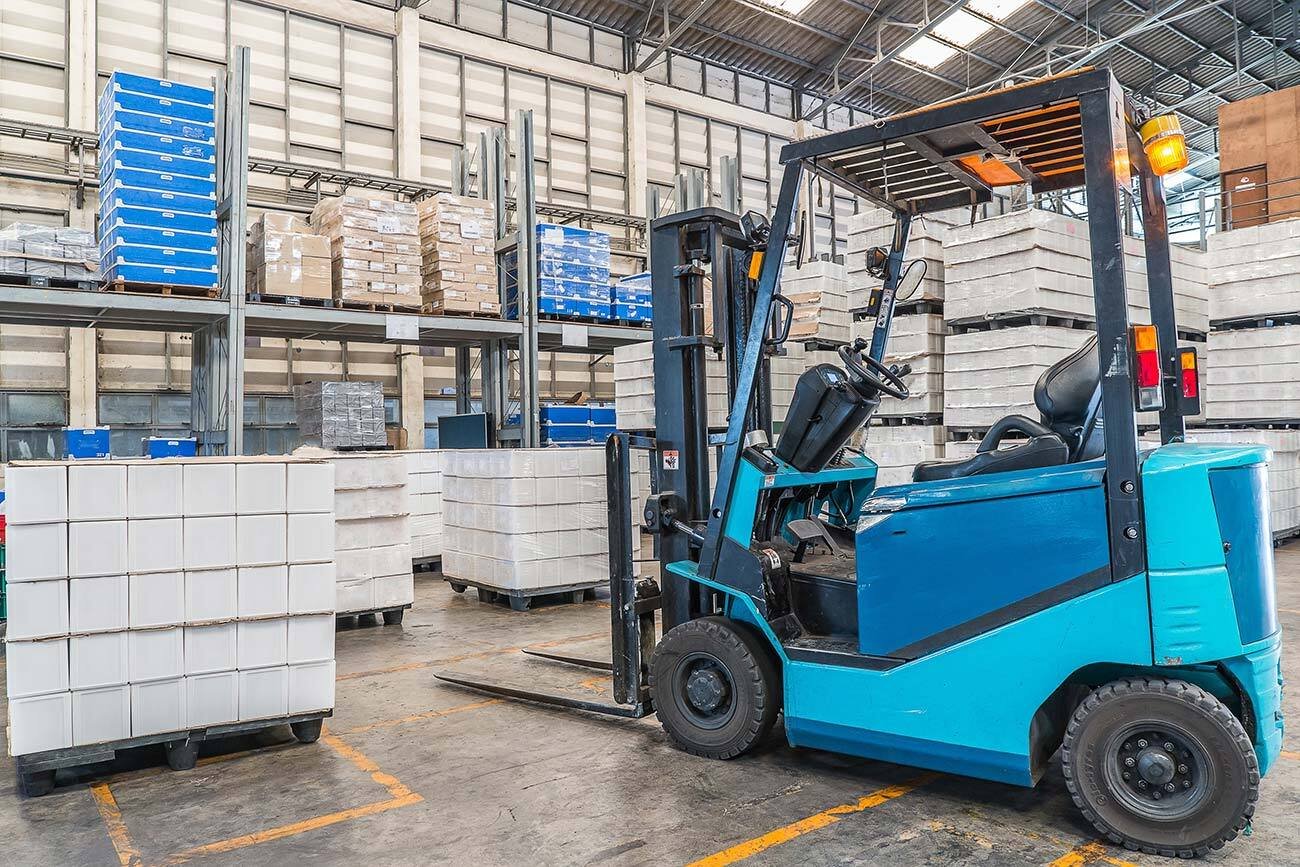
Industries That Use Dedicated Freight
- Automotive Manufacturing
- Chemical and Industrial Bulk
- Consumer Products & Retail Distribution
- Food & Beverage Cold Chain
- Healthcare and Pharmaceuticals
- High-Tech & Electronics
- Industrial Manufacturing & Packaging Materials
Automotive Manufacturing
Original equipment manufacturers (OEMs) and Tier-1 suppliers rely on dedicated fleets to keep assembly lines fed with just-in-time (JIT) parts. A committed tractor-trailer pool allows sequenced components—engines, seats, wiring harnesses—to arrive in the exact order of production, reducing costly line‐side inventory. Because model mixes change frequently, carriers design flexible milk runs that can absorb schedule tweaks without disrupting takt time. Dedicated drivers are also trained in stringent yard‐management and dock procedures, minimizing dwell time at high-velocity cross-docks.

Chemical and Industrial Bulk
Producers of resins, coatings, lubricants, and industrial gases need specialized equipment (tankers, hazmat-certified trailers) and rigorously trained drivers. A dedicated contract ensures those assets are always available, eliminating the scramble for compliant capacity during market squeezes. Carriers handle regulatory paperwork—placards, MSDS documentation, 49 CFR compliance—so plant managers can focus on throughput. Backhaul programs often pair compatible non-hazmat loads on return legs, reducing empty miles without violating commodity segregation rules.
Consumer Products & Retail Distribution
Big-box chains, CPG giants, and e-commerce brands use dedicated fleets to replenish regional DCs and store networks on fixed schedules. Because promotional calendars drive predictable volume surges, carriers can pre-stage extra tractors or drop trailers for “Black Friday” and other retail peaks. Uniformed drivers and branded trailers reinforce the retailer’s image and support strict on-time-in-full (OTIF) scorecards. The result is fewer stock-outs, tighter appointment compliance, and real-time SKU visibility via integrated TMS dashboards.
Case studies and testimonials on a broker’s own website can be helpful, provided you read between the lines. Strong case studies will cite specific KPIs—on-time delivery percentages, cost savings achieved, or claims ratios—that demonstrate measurable value. If the broker serves your industry, look for examples involving similar cargo or lanes. Pair these self-published success stories with independent reviews to create a balanced, credible picture of each broker’s service quality.
Food & Beverage Cold Chain
Perishable freight can’t afford equipment uncertainty; dedicated refrigerated fleets give producers temperature-controlled capacity 365 days a year. Multi-compartment reefers let carriers consolidate frozen, chilled, and ambient SKUs while still meeting HACCP and FSMA traceability rules. Predictable routes make it easier to schedule wash-outs, sanitize trailers, and swap reefer units for preventative maintenance—critical for dairy, meat, and produce shippers. Seasonal surges (e.g., summer beverage spikes or holiday baking demand) are covered through surge riders baked into the master contract.

Healthcare and Pharmaceuticals
Dedicated service protects high-value, high-risk cargo like vaccines, diagnostic equipment, and Class II/III medical devices. Drivers undergo GMP and HIPAA awareness training, while tractors are often equipped with redundant temperature probes and door-alarm telemetry. Because chain-of-custody is paramount, carriers provide real-time location and environmental data, plus secure parking protocols for any unscheduled stops. Regulatory audits are streamlined because one logistics partner manages SOP documentation and validation across the entire lane set.
High-Tech & Electronics
Electronics manufacturers ship fragile, theft-attractive components that demand white-glove handling and tight transit windows to meet build-to-order cycles. Dedicated fleets allow carriers to spec air-ride suspensions, shock-recorders, and sealed trailers to protect sensitive circuitry. Pre-cleared driver rosters reduce risk in secure campus deliveries, where background checks and dock appointments are mandatory. With predictable, closed-loop routes, carriers can coordinate cross-docks near air cargo hubs for rapid mode transfers when yield shortages force expedited replenishment.
Industrial Manufacturing & Packaging Materials
Steel coils, corrugated boxes, pallets, and extrusion profiles move on dedicated flatbeds and dry vans that shuttle between plants and downstream converters. Because these commodities are bulky yet rhythmic, dedicated capacity drives better cube utilization and lowers demurrage at mills. Carriers often implement drop-and-hook programs so production lines never idle waiting for empties. Telematics-driven ETA alerts help maintenance crews and yard jockeys stage forklifts and slitter lines just in time for unload.
TALK TO AN EXPEDITOR NOW
Get an Expedited Freight Quote for Your Time-Critical Shipping Needs
Choosing a Dedicated Freight Partner
Choosing the right dedicated carrier is a crucial decision. Logistics experts offer several guidelines for shippers selecting a partner:
Asset-Based Capability
Alignment and Expertise
Flexibility and Scale
Technology and Innovation
Safety and Compliance

Frequently Asked Questions
What is expedited freight shipping?
How is expedited freight different from standard LTL/FTL shipping?
When should I use expedited freight services?
What modes and vehicles are used for expedited shipping?
How fast is expedited freight delivery?
Are expedited freight services reliable and safe?
How are expedited shipping costs calculated?
What factors influence expedited freight rates?
Are there weight or size limits for expedited shipments?
How do expedited services guarantee on-time delivery and tracking?
Related Blog Posts

How to Find A Freight Broker Near Me
Freight brokerage—also called logistics brokerage or transportation brokerage—is the business of connecting companies that need to ship goods with the carriers that can transport them. A freight broker acts as an intermediary between shippers (the cargo owners) and freight service providers (usually trucking companies).

Logistics Trucking Company
Ensuring these goods reach their destinations efficiently is a complex task – one that logistics trucking companies specialize in. These firms help businesses coordinate shipments, manage transportation, and streamline the flow of products. This article explains what a logistics trucking company is, the advantages of hiring one, common challenges in the industry, how to choose the right provider, and emerging trends shaping the future of...

Obstacles & Opportunities: 5 Greatest Challenges In Expedited Trucking
Growing pains are a reality in every industry, and expedited freight is no exception. As the market evolves and public policy changes, trucking companies of all stripes must adapt or risk going out of business. The American Transport Research Institute (ATRI) recently published a report on the challenges that carriers must deal with going forward.

Tesla, Navista Compete To Unveil The Leading Electric Trucks
Tesla has long billed itself as the leader in advanced and sustainable vehicles. But when it comes to electric trucks, the company is at risk of being upstaged.

Expedited Freight Quote
A freight quote is an estimate provided by a carrier or third-party logistics provider that outlines the cost of transporting goods from one location to another. It’s based on a variety of factors, including the weight and dimensions of the shipment, the distance between pickup and delivery locations, and the chosen method of transportation.
Air Cargo Charter
Air cargo charters are designed for flexibility and urgency, capable of mobilizing aircraft on short notice to meet tight deadlines or navigate around disruptions like natural disasters, supply chain bottlenecks, or geopolitical challenges.
THE RISE OF EXPEDITED FREIGHT JOBS
In today's fast-paced logistics world, getting things delivered on time is very important for both businesses and consumers. With the increasing demand for rapid delivery services, expedited freight has become an essential component of the supply chain.
Industries We Serve
Modern day hot shot trucking provides the speed and exclusivity you need to meet the most demanding and time-sensitive shipping requirements. We use every resource, avenue, and channel available to ship your freight by ground or air. Designed specifically to address supply and distribution problems that arise without warning, hotshot trucking tactics involve coordinating a network of carriers in a variety of locations. By calling on the vehicles closest to your supply or distribution points, hotshot brokers can fill any sudden gaps in your supply network almost as soon as they happen. This minimizes the disruption to your business and allows you to quickly return to ordinary operations, weathering the storm without skipping a beat.
Automotive
The automotive supply chain already has significant challenges. Don’t let malfunctioning equipment stop the production line. Step on the gas with HotShotTrucking.com’s suite of services that will get you back in the fast lane. With HotShotTrucking.com, companies are devising shipping strategies to swiftly deliver critical parts and equipment — whether it's ground expedite service with sprinter vans, box trucks and 53-foot tractor trailers or air freight and air cargo.
Aviation & Aerospace
Every moment a commercial airliner sits on the ground, it costs an airline money. Expedited freight services by HotShotTrucking.com can get you back in the air with prompt delivery of parts and equipment throughout North America. We are equipped with the expertise to navigate the complexities of shipping jet engines and other types of loads, and our network of hot shot drivers has extensive experience transporting aviation assets.
Construction
One shipping delay can snowball and cause delays throughout your entire project. You need an experienced 3PL provider who understands the construction industry and has the logistical reach to deliver your freight on time, anywhere. That 3PL partner is HotShotTrucking.com. Whether in the air or on the ground via truck and trailer, we can connect companies to expedited freight services for the prompt delivery of parts and equipment throughout North America.
Mining & Metals
From cranes to chemicals to excavators to conveyor belts, HotShotTrucking.com has the experience and industry know-how required for shipping sensitive, oversized, and hazardous equipment. Third-party hot shot trucking and logistics providers such as HotShotTrucking.com specialize in devising and implementing innovative shipping solutions, ensuring mines can swiftly return to operation. We’ll pick up your shipment, deliver it to the airport and receive it at the other end – providing hand-carried service as necessary or required.
Manufacturing
Every moment a manufacturing facility or factory sits idle costs a company money because of the high costs involved. With many manufacturers building to only just-in-time production rates, any disruption threatens parts and vehicle inventories. This is where the speed and expertise of freight services from HotShotTrucking.com can make a difference throughout the entire manufacturing supply chain. We do all the logistical legwork to find the optimal solution for your job, whether it's an exclusive air charter or expedited ground shipping.
Telecommunications
From servers to cell towers, information, voice, and data must flow to keep businesses, production, and the public online and connected. When equipment goes dark, depend on HotShotTrucking.com to get your systems flashing green again. This is where the speed and experience of trucking and freight services from HotShotTrucking.com can help. Our hot shot truck network excels at the prompt delivery of parts and equipment throughout North America.
Oil & Gas
The oil and gas industry faces challenging conditions in offshore and onshore oil rigs, often in remote locations with limited infrastructure. Don’t let oil pumps or pipelines sit idle waiting for equipment. By having the right plans, parts, people, and logistics partner like HotShotTrucking.com, you can effectively mitigate plant or pump downtime, unscheduled disruptions, and equipment failures.
Cost of Urgent Shipping
Which of our specialized shipping services best fits your needs?
Blog and Resource Center
How AirFreight.com Solved a PGA Tour Shipping Emergency
Learn how AirFreight.com located a lost shipment and helped save the PGA Golf Tour.
How AirFreight.com Saved The Farm By Solving A Major Shipping Delay
Learn how we saved a Montana-based artisanal farm thousands of dollars by expediting a shipment of perishable goods.
Expedited Shipping Vendor Comparison
We’ve done the research for you. This vendor comparison sheet breaks down how AirFreight.com stacks up against the competition.

talk to an expeditor now
Get a Quote in Minutes for Your Time Critical Freight Needs
GET A QUOTE

